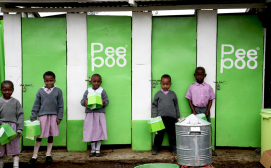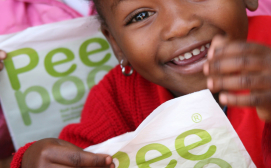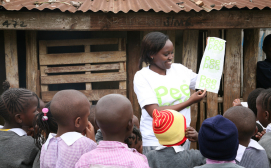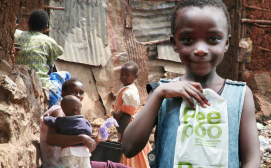Project Lead(s): Anders Wilhelmson
Issue
More than 2.5 billion people lack access to basic sanitation, with more than a billion people living in urban slums, a figure expected to double by 2020.
Traditional sanitation methods are not adapted to the current situation, since they often are part of large, complex infrastructural systems and rigid institutional processes.
Solution
Peepoo is a personal, single-use, self-sanitizing, fully biodegradable toilet that prevents waste from contaminating the environment. It offers the user a clean, unshared toilet, encloses the waste and begins the sanitization process immediately after use.
This project aimed to demonstrate a reduced disease burden by using the Peepoo sanitation system in a number of schools.
The study involved 37 schools using a four-armed, cluster-randomized trial design to measure the effectiveness of Peepoo sanitation and deworming, independently and in combination.
The project also provided training in hygiene for children, teachers and parents.
Of schools involved in the trial, fewer than one third always provided water for hand washing and had a pit latrine.
Of the 6,439 school children participating in the study, 3,500 have been surveyed concerning socio-economic status, sanitation situation and hygienic behaviour, as well as infection rates, as determined by stool analysis (2,220 samples).
The average infection rate for soil-transmitted helminthes (STH) were 17% among those school children evaluated and, for any gastrointestinal parasite, the infection rate was 48%. Among the study population, 84% stated that illness was the most common reason to be home from school.
Outcome
Through this project 3,960 school children are now using hand-washing facilities and have access to the Peepoo toilet.
Teachers have indicated that there has been improved attendance, as well as a reduction in diarrheal diseases, leading to improved health among the children.
One of the major achievements of the study team is that their contact with affiliations organizing deworming in public schools has provided them with the possibility to present their results regarding the situation in urban slum schools to the Ministry of Education, Science and Technology.
The final follow-up analysis of the study (one year after the intervention) has not yet been completed.
A large amount of data has been collected and will result in at least three scientific publications and the team will apply for Transition To Scale (TTS) funding when the proof of concept stage is finalized.





